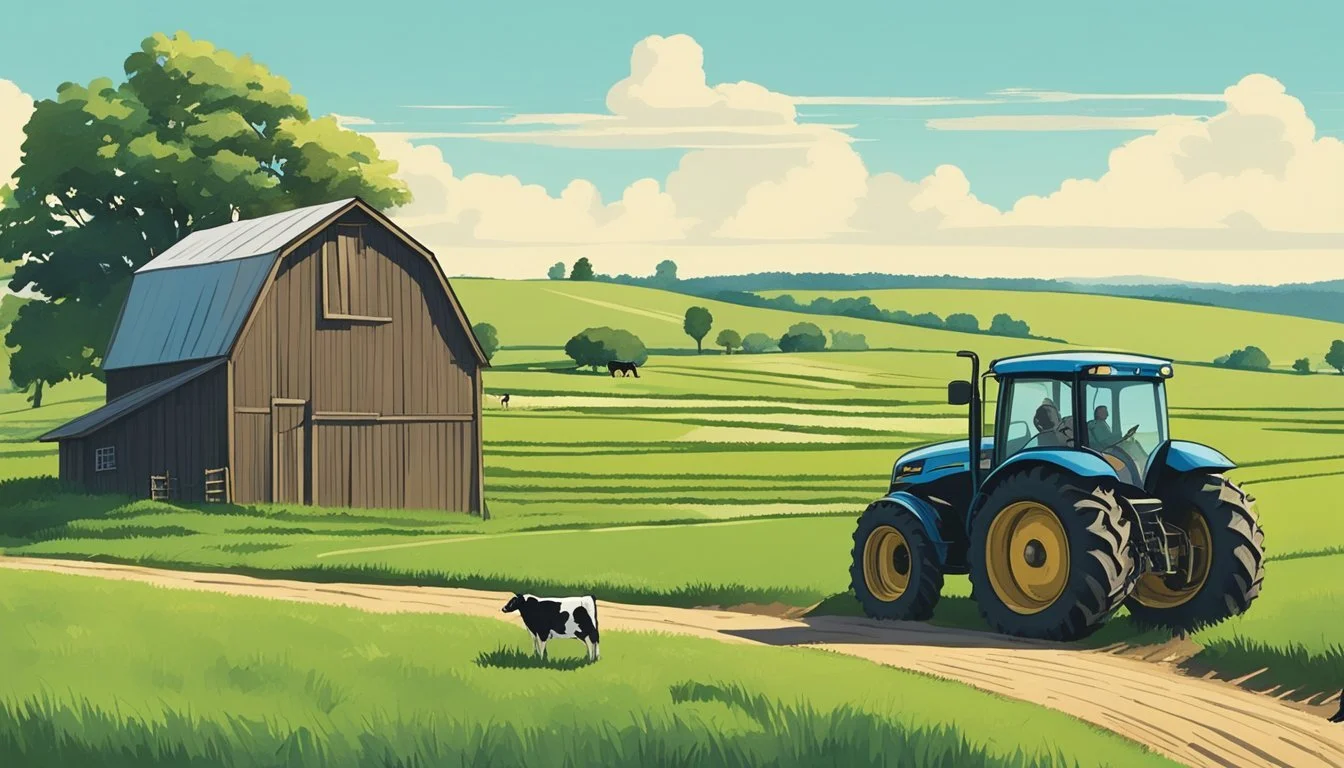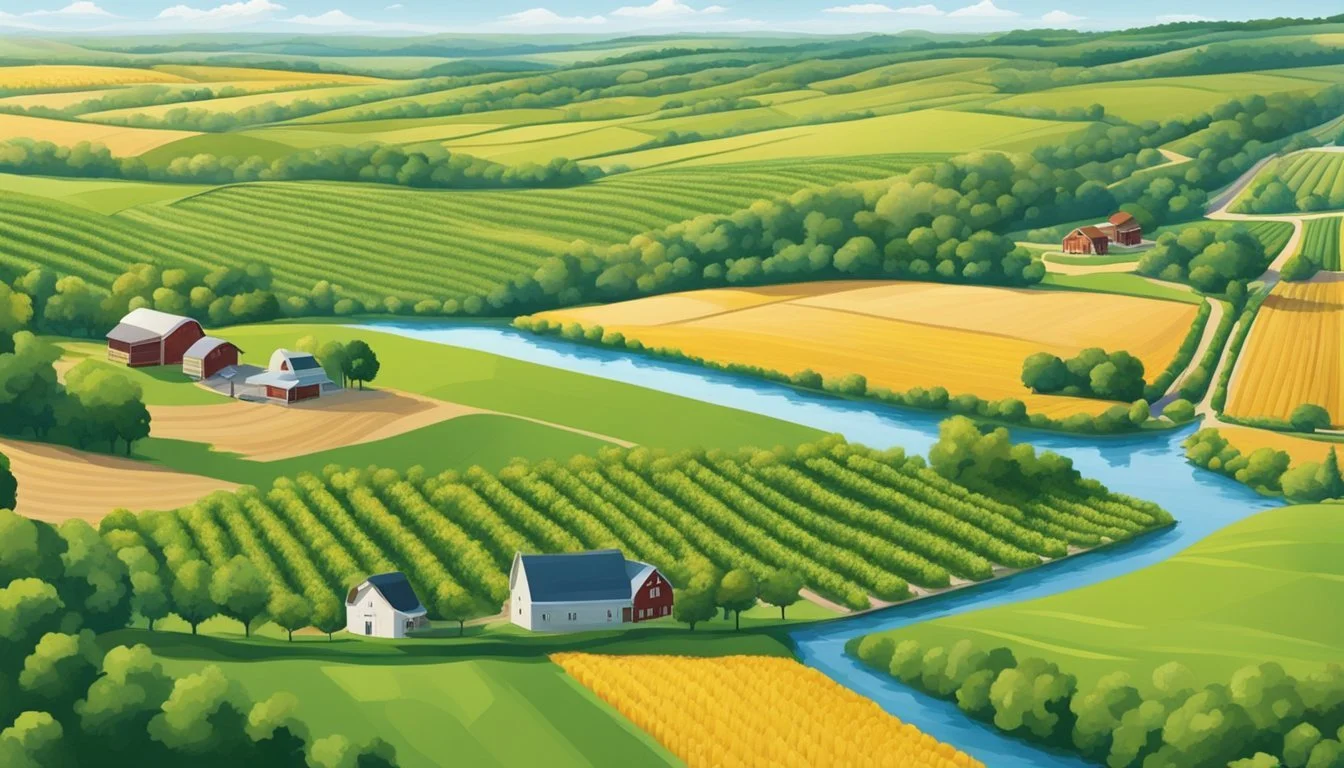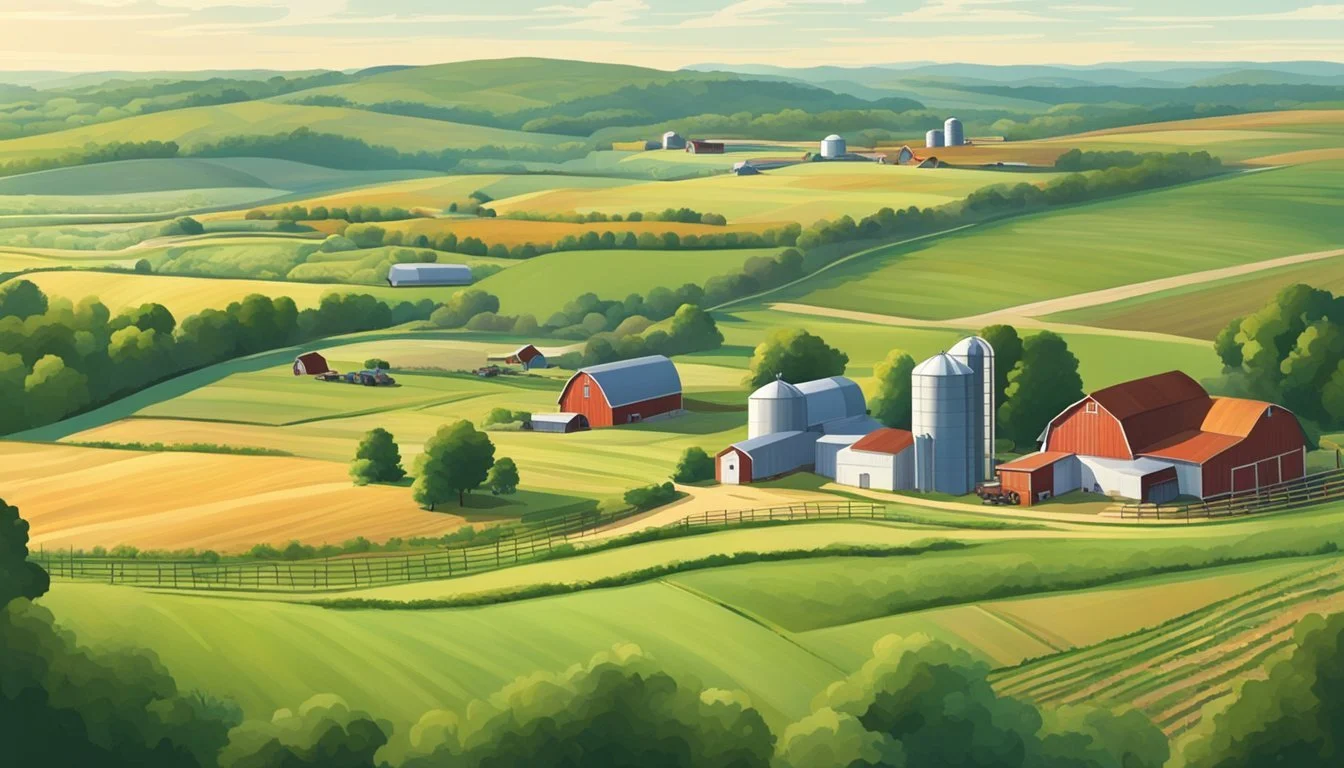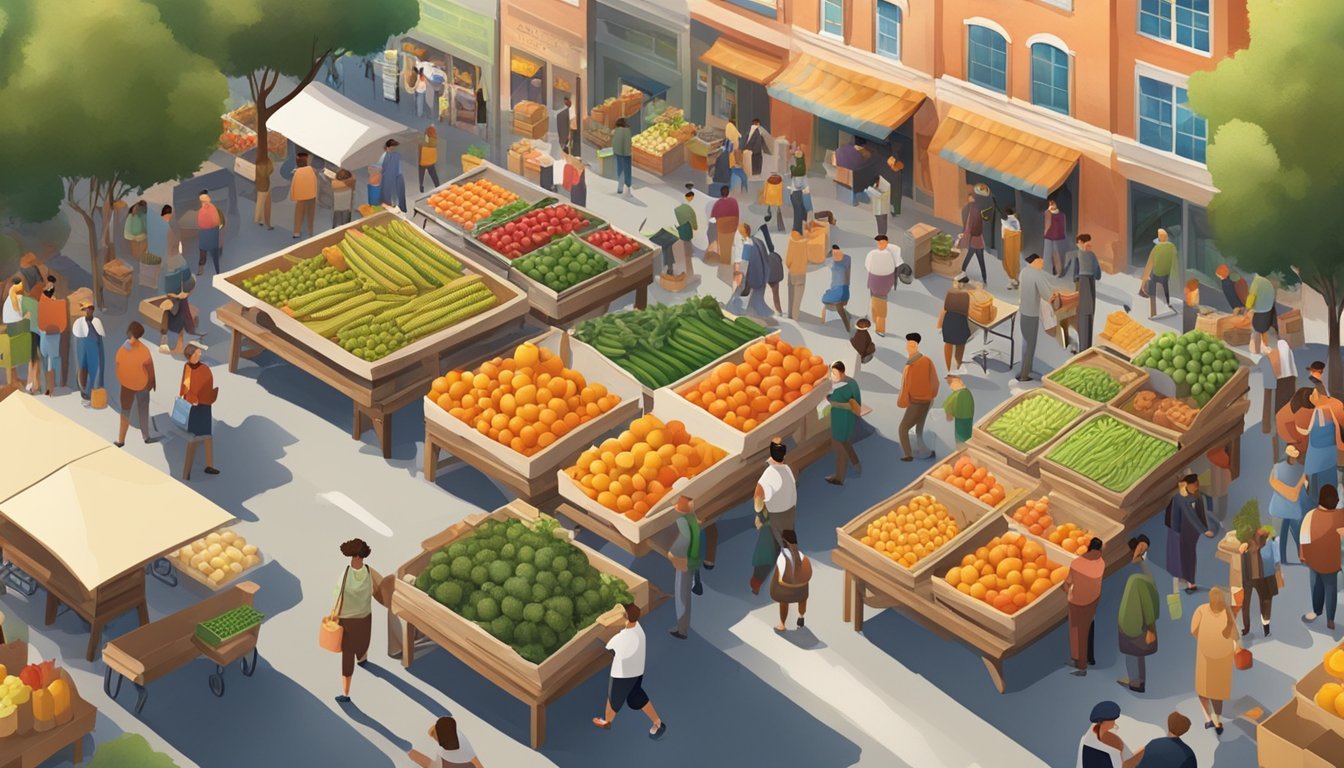Guide to Farming in Missouri
Essential Tips for Successful Agriculture
This Article is Part of Our State by State Farming Guide
Missouri stands as a testament to the diversity and resilience of agricultural practices in the United States. With its rich, fertile soils and equitable climate, it offers an ideal landscape for both seasoned and nascent farmers to cultivate a wide variety of crops. The state is characterized by distinct agricultural regions, from the forested hills of the Ozark Plateau to the productive farmlands of the Bootheel, each with their own opportunities and challenges. The importance of adapting to specific market niches, especially in practices such as fish farming, has been endorsed by specialists, underlining the need for a strategic approach to farming in the region.
Support structures are also in place to aid beginning farmers and ranchers in Missouri. Newcomers to the industry can access resources designed to promote sustainable and efficient farming practices, focusing on soil health, water management, and environmental care. These initiatives aim to ensure that underserved and socially disadvantaged groups get a foothold in the industry, increasing the overall standard of living and contributing to the state's agricultural legacy.
The state provides extensive resources to its agricultural community, including the Missouri Crop Resource Guide, which offers information and tools to help optimize crop production for profit and sustainability. Resources encompass a range of topics from grain management to irrigation, and risk management, ensuring Missouri's farmers remain well-informed and prepared to face the dynamic challenges of modern agriculture.
Understanding Missouri’s Agricultural Landscape
Missouri's farms are as varied as its terrain, showcasing agricultural diversity unmatched in many regions. Its farmlands extend from the Ozark Plateau—known for its forested hills—to the fertile soil of the Bootheel region, reflecting a patchwork of agronomic opportunities.
The Ozark Plateau, with its rolling hills, offers pastureland and woodlands ideal for cattle farming and forestry operations. Here, the soil varies in quality but is generally well-drained and suitable for horticulture and small-scale agriculture.
Moving towards the Bootheel region, one encounters flatlands with rich alluvial soils. This area is particularly distinguished by highly fertile soil, optimal for growing crops like cotton, rice, and soybeans. (how long do soybeans last?) The availability of such prime farmland enables intensive crop production.
Following is a snapshot of Missouri's diverse agricultural zones:
Ozark Plateau: Forested hills, mixed-use farms, horticulture.
Northern Plains: Row crops like corn and soy.
Bootheel Region: Cotton, rice, and other high-yield crops.
The state's tightly knit relationship with varied soil compositions, accentuated by its varying climate, means that farms must adapt to the best use of their lands. Precision agriculture is becoming increasingly important, as it allows farmers to fine-tune their practices to the specific needs of their soil and micro-regions within a single farm. This form of agriculture leverages technology, providing tailored care for crops to optimize yield and sustainability.
In summary, understanding Missouri's agricultural landscape requires an appreciation for its dramatic variation from the hilly Ozarks to the flat, fertile Bootheel. Each area offers unique advantages, shaping the state's farming practices and outputs.
Starting a Farm in Missouri
In Missouri, embarking on a farming venture requires careful planning, securing appropriate land, obtaining financing, and leveraging educational resources. The University of Missouri Extension provides valuable support to beginning farmers, including educational classes and one-on-one assistance.
Creating a Business Plan
A business plan is essential for new farmers in Missouri. It serves as a blueprint that outlines goals, production practices, and financial forecasts. The University of Missouri Extension offers resources and workshops to aid in developing a comprehensive business plan, equipping farmers with the knowledge to create a sustainable operation.
Resources for business planning include:
Workshops
Educational classes
Technical assistance
Finding and Acquiring Land
Missouri offers diverse opportunities for acquiring farmland, which can range significantly in size and function. Aspiring farmers must carefully evaluate land based on its suitability for their intended agricultural endeavors. Information on land acquisition is available through the University of Missouri Extension’s programs.
Considerations for land acquisition:
Land size
Soil quality
Water availability
Accessing Funds and Grants
Funding is critical to start and develop a farm. In Missouri, beginning farmers have various options, including state-sponsored loan programs and federal grants. The Missouri Department of Agriculture's Beginning Farmer Loan Program is one example, designed to assist residents in establishing their farms. Additionally, enrollment in federal work authorization programs is necessary for those employing laborers.
Funding options include:
State-sponsored loans
Federal grants
University of Missouri Extension Support
The University of Missouri Extension is a valuable ally for Missouri's beginning farmers. They offer experiential learning opportunities, technical assistance, and crucial agricultural education tailored to the unique needs of new agricultural entrepreneurs.
Support from the University of Missouri Extension encompasses:
Pilot training workshops
Internships
Customized one-on-one assistance
Missouri’s Top Agricultural Products
Missouri's agricultural landscape is dominated by the production of staple crops such as soybeans and corn, alongside a robust livestock sector. Specialty crops also contribute significantly to the state's economy, reflecting Missouri's diverse agricultural capabilities.
Cultivating Soybeans and Corn
Soybeans are Missouri's leading agricultural commodity. The state dedicates more than 5 million acres to soybean cultivation, generating approximately $2.2 billion in annual cash receipts. This places Missouri amongst the frontrunners in soybean production nationwide. Corn, not far behind, is also a fundamental crop, with production figures solidifying Missouri's status in the top tier of the nation’s corn growers.
Soybeans
Acres: >5 million
Cash Receipts: ~$2.2 billion
Corn
Top 10 National Ranking
Raising Livestock
The livestock sector in Missouri is a cornerstone of the state's agricultural industry. Farms are predominantly family-owned, averaging around 269 acres in size. Key livestock products include cattle and calves, hogs, and turkeys, which are all integral to Missouri's agricultural output and economy.
Livestock Products:
Cattle/Calves: Essential to the meat industry
Hogs: Significant for pork production
Turkeys: Important poultry commodity
Growing Specialty Crops
Specialty crops in Missouri, such as grape varieties, not only add to the agricultural variety but also support a burgeoning wine industry. Though these crops may cover lesser acreage compared to soybeans and corn, they play a crucial role in diversifying the state's agricultural production and enhancing its economic landscape.
Specialty Crops:
Grape Varieties: Support local wine production
Other Crops: Add to agricultural diversity
Farm Management and Operations
Effective farm management and operations in Missouri hinge on adopting sustainable practices, maintaining farm resources, navigating market dynamics, and understanding the distinction between family-owned and corporate farming systems. The following subsections delves into these critical areas.
Sustainable Farming Practices
In Missouri, sustainable farming practices are central to farm management. They seek operational efficiency and environmental stewardship. Techniques include crop rotation, soil conservation, and integrated pest management, which mitigate environmental impact and enhance productivity.
Farm Maintenance
Proper maintenance is essential for the longevity of farm equipment and infrastructure. Missouri farmers must regularly service machinery and maintain buildings to ensure smooth operations. They also manage land to prevent soil degradation, employing organic methods where possible to preserve farm health.
Marketing and Selling Agricultural Products
To sell their products, farmers in Missouri leverage various avenues such as farmers' markets, CSA programs, and wholesale distribution. Strong marketing strategies emphasize the quality and origins of products, especially when dealing with organic or locally sourced commodities.
Family-Owned vs. Corporate Farming
There is a distinct difference between family-operated farms and corporate entities. Family-owned farms in Missouri often focus on traditional techniques and relationship-driven markets, whereas corporate farms may prioritize scalability and technological implementation to manage large-scale production.
Educational and Government Resources
Missouri offers a wealth of educational and government resources designed to support and enhance the state’s farming and agriculture industry. These resources include conservation programs, the Missouri Department of Agriculture, and various forms of technical and financial assistance.
Conservation Programs
The USDA and Missouri's local agencies have implemented several conservation programs to assist farmers and ranchers in preserving natural resources. These initiatives often focus on soil health, water quality, and sustainable practices. Farmers may access resources and guidance on best practices for environmental stewardship.
Soil and Water Conservation Program: Offers assistance for soil erosion control and water quality improvement projects.
Missouri Agroforestry Program: Integrates trees and shrubs into agricultural systems to enhance productivity and conservation.
Missouri Department of Agriculture
The Missouri Department of Agriculture (MDA) plays a pivotal role in facilitating growth, education, and innovation in the state's agricultural sector. The department provides a range of resources and development opportunities for Missouri's farming community.
Agricultural Business Development: Support for creating sustainable and profitable agricultural businesses.
Missouri Grown Program: Promotes Missouri-made agricultural products.
Technical and Financial Assistance
Farmers in Missouri have access to both technical and financial assistance programs to ensure their operations are efficient, competitive, and economically viable. The programs are often available through partnerships between state and federal entities.
USDA's Farm Service Agency (FSA): Offers loans and grants to help farmers expand, improve, and maintain their farms.
Missouri Farm to School: Links local farms with schools to supply fresh food, while also educating the community about agriculture.
These resources are designed to empower Missouri farmers with the knowledge and tools needed to succeed in a rapidly evolving industry.
Community and Economic Impacts
The tapestry of Missouri's economy is woven with significant strands from agriculture and forestry, impacting every aspect from local communities to statewide financial metrics.
Supporting Local Communities
Missouri's farmers and ranchers are the lifeblood of local communities. By supplying agricultural commodities, they support local economies, create jobs, and foster community sustenance. Specifically, farmers are central to maintaining the viability of rural areas, preserving local traditions, and enhancing the local food supply.
Job Creation: Agriculture contributes to the creation of numerous jobs, both directly and indirectly.
Community Support: By sustaining rural economies, farmers and ranchers help to support local services, schools, and infrastructure.
Agricultural Economic Impact
In financial terms, agriculture injects a substantial amount of money into Missouri's economy. The production and sale of agricultural commodities, including crops and livestock, generate revenue that ripples through the state's economy.
Economic Contribution: $93.7 billion from agriculture and forestry industries.
Value Added: $34.9 billion to Missouri's economy by the agriculture sector.
Employment: Approximately 456,618 jobs are linked to these industries.
Table 1: Agricultural Economic Indicators
Indicator Value Economic Contribution $93.7 billion Value Added $34.9 billion Jobs Supported 456,618
This sector's impact is evident across various realms – from the individual farmer to the aggregate state level – trailing a legacy of economic prosperity and community resilience.
Future of Farming in the Show Me State
Missouri, commonly known as the Show Me State, is on the verge of an agricultural transformation. With a rich agricultural tradition, it's paving the way for future farming practices. The state's commitment to innovation can be seen through significant federal grants aimed at climate-resilient crops and livestock.
Innovation in Agriculture
Regenerative Agriculture: Missouri is fostering regenerative agricultural methods to rejuvenate its vast land acreage and enhance sustainability.
Digital Agriculture: Utilization of AI and digital technologies is projected to increase productivity and profitability.
Climate-Resilient Projects Missouri's farming future includes a determined focus on climate resilience. Funded projects are expected to revolutionize agriculture by creating farming techniques that withstand environmental challenges.
Economic Impact Agriculture is a cornerstone of Missouri's economy, with a substantial portion of its productivity rooted in farming. Developments in smart farming tactics aim to solidify this economic position by maximizing resource efficiency.
Educational Initiatives
Conferences and educational programs are vital for disseminating knowledge of advanced farming practices throughout the Show Me State's agricultural community.
Through these efforts, Missouri aims to uphold and evolve its storied agricultural tradition while addressing the needs of the modern world. The agricultural sector is embracing change, ensuring the Show Me State remains at the forefront of sustainable and efficient farming practices.
Additional Resources and Contacts
Farmers in Missouri seeking support can access a variety of resources and contacts dedicated to their success in sustainable agriculture. For those who are new to farming or belong to societal groups that have been underserved, the University of Missouri Extension is a vital point of contact. They offer guidance on improving farm efficiency while maintaining environmentally friendly practices. Interested parties can reach out for assistance at:
The Missouri Farm Bureau is another fundamental resource for farmers in the state. Established by and for farmers, the bureau disseminates information that is imperative for agricultural proficiency.
Web: Missouri Farm Bureau
The USDA Farm Service Agency in Missouri provides a comprehensive set of services, including the Missouri AgrAbility Project, which focuses on supporting those in agriculture who are facing limitations due to a disability.
Call: 573-882-2731 or 1-800-995-8503
Email: AgrAbility Project Email
Academic resources can be found at the University of Missouri Libraries. These resources encompass a wide range of agricultural knowledge and are particularly useful for research and innovation.
Finally, for insights into the economic impact of local food sales by farms in Missouri, valuable reports and analysis are available and can enlighten farmers on the benefits of value-added products.
Search for Reports: Local Food Sales Information








